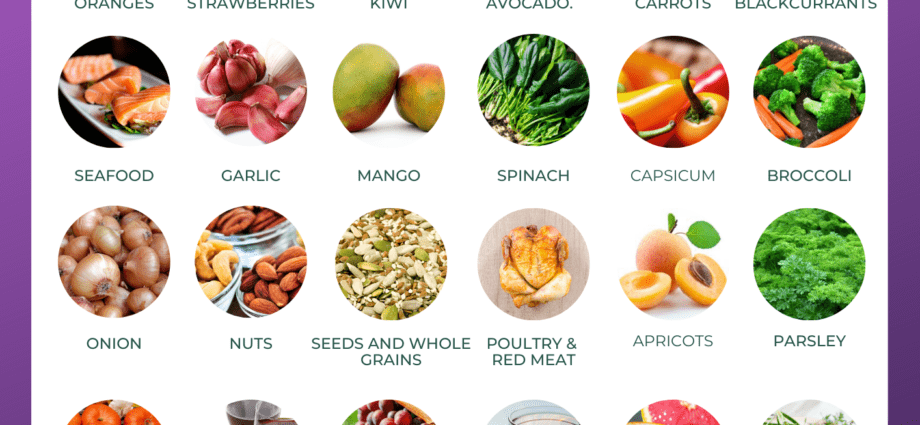Contents
For many centuries, people have been looking for a solution to the mystery of preserving eternal youth, health and beauty for many years. And at the beginning of the third millennium, science took a confident step towards solving the mystery, based on knowledge about free radicals and antioxidants.
Antioxidants are the defenders of our body against the harmful effects of toxic substances that have a detrimental effect on human health. With the correct use of these substances, the rate of aging of the body decreases, the development of cardiovascular, endocrine and oncological diseases is prevented.
Antioxidant-rich foods
General characteristics of antioxidants
Term antioxidants 30 years ago, it was used exclusively to denote antioxidant substances that prevent iron corrosion, spoilage of food and other organic substances present in canned food, cosmetics, and creams.
And now, several decades later, a revolutionary free-radical theory appears in medicine, which turned all the established ideas about antioxidants upside down.
It turns out that in our body there are aggressive compounds called free radicals. They destroy the cells of the body by oxidizing their molecular structures.
It is with an excess of such substances in the body that antioxidants fight. Antioxidants include vitamins A, E, C, P, K, bioflavonoids, some sulfur-containing amino acids, zinc, copper, selenium, iron and alcohol in small amounts.
Daily requirement for antioxidants
Depending on the type of antioxidant, its daily requirement for the body is determined. So vitamin A is necessary for the body in the amount of 2 mg, E – 25 mg, C – 60 mg, K – 0,25 mg, and so on. Trace elements are required in amounts ranging from 0.5 mg (selenium) and up to 15 mg (for example, zinc and iron).
The need for antioxidants is increasing:
- With age, when the body’s ability to independently produce useful substances decreases, and the number of free radicals increases.
- Under unfavorable environmental conditions (work in hazardous industries).
- In a state of increased stress.
- With high mental and physical stress.
- In active smokers, when the absorption of nutrients by the body decreases.
The need for antioxidants decreases:
With individual intolerance to certain groups of antioxidants.
Antioxidant absorption
Most vitamins and minerals are well absorbed by the body along with food. Therefore, it is usually recommended to take vitamin-mineral complexes after meals.
Useful properties of antioxidants, their effect on the body:
Vitamin A and its precursor beta-carotene normalize the condition of the mucous membranes, improve the condition of the skin and hair, prevent the development of oncological diseases, and are necessary for strengthening the eyes.
Vitamin C is responsible for the body’s immunity, strengthens the cardiovascular system, actively fights against mutations at the gene level.
Vitamin E is essential for the nervous system, protects cell membranes from destruction.
Selenium slows down the oxidation of fats, blocks the toxic effects of heavy metals.
Zinc is essential for the immune system, necessary for cell growth and repair. Zinc has a positive effect on the endocrine system of the body.
Interaction with essential elements
Antioxidants actively interact with each other. For example, vitamins E and C mutually reinforce each other’s effect on the body. Vitamin E is highly soluble in fats, just like beta carotene. Vitamin C is highly soluble in water.
Signs of a lack of antioxidants in the body
- weakness;
- increased irritability;
- pallor of the skin;
- apathy;
- frequent infectious diseases;
Signs of excess antioxidants in the body
Antioxidants that enter the body from food, in case of excess, are easily excreted from the body on their own. With an excess in the body of artificially manufactured antioxidants (vitamin-mineral complexes), a condition described in the medical literature as hypervitaminosis may occur, accompanied in each case by certain disorders and signs.
Factors affecting the content of antioxidants in the body
The content of antioxidants in the body is influenced by the general health of a person, his age and diet.
It is difficult to overestimate the positive effect that antioxidants have on our body. They protect our body from the damaging effects of free radicals, strengthen immunity and slow down the aging process!










